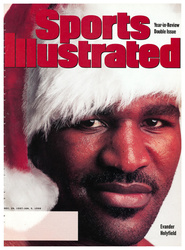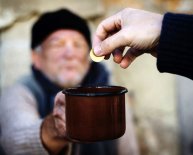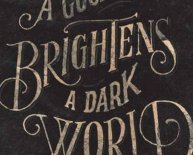
Where is good deeds playing?
 That's a translation from the original Canadian Matt Stairs,
That's a translation from the original Canadian Matt Stairs,
which means a doughy, goateed and neckless Canuck who last
season slammed 27 home runs in only 352 at bats for the Oakland
A's and who this winter is again the idol of Mexico's
northwestern plains. This is Stairs's sixth season playing for
Navojoa's Los Mayos in the Mexican Pacific League, and though
he's easily the oddest-looking character in Navojoa-save,
perhaps, the occasional wayward boar-the natives have embraced
him and are holding on tight. "He's part of us, " says Navojoa
mayor Carlos Quiroz. "When Matt is hitting well, the people are
happy. When he's not, the people are sad."
Victor Cuevas, Los Mayos' principal owner, says, "People love
Matt Stairs." And he's right. They love Stairs because he wins
batting titles and hits long home runs over the Tecate beer sign
in right-centerfield. They love him because he'll play any
position at any time. They love him because even though he makes
his living as a leftfielder and cleanup hitter in the major
leagues, he comes to play in a rickety-bus league. They love him
for his jovial unshaven face and his big belly and the way,
between spits of chewing tobacco, he takes hard puffs off his
cigarettes like a hard-boiled Navojoan. They love him for his
easy manner, the money he raises and the way he holds their
children. "He's done more for this place than any baseball
player ever has, " says Antonio Ortega Orozco, who has been a
radio broadcaster for Los Mayos for 15 years. "He always has
kids around him. When you see the way he talks with them, you
can see in his eyes how much he cares."
It's an unlikely love affair for a puck-crazy boy from snowy
Fredericton, New Brunswick, but the 29-year-old Stairs has
remained faithful to Navojoa even as he has developed into a
U.S. phenomenon, mashing baseballs with astonishing efficiency
from his foot-in-the-bucket stance. Stairs, barely 5'9" and at
least 210 pounds, came up from the minors and hit .351 with
runners in scoring position during the Boston Red Sox' drive for
the playoffs in 1995. That winter he signed a free-agent
contract with the A's, and in '96 he hit 10 home runs in 137 at
bats. A's fans call him the Wonder Hamster.
"Bad body, weird stance-he doesn't look like he can hit, " says
Lorenzo Bundy, a longtime minor league instructor and the Los
Mayos manager. "He just rips."
Not until injuries ended his career as the star sniper on
Fredericton High's hockey team did Stairs begin ripping in
earnest. "All I wanted as a kid was to play in the NHL, " he
says. "I didn't get up at 5 a.m. and go to the rink every day
for nothing. Baseball was just a way to kill time in the
off-season."
After twice tearing up his right knee, Stairs gave up hockey and
joined Canada's national baseball development program. He hit
well enough to become Canada's starting shortstop in the 1988
Olympics. In '89 he was signed as a free agent by the Montreal
Expos, and the following winter his Navojoan adventure began.
"My first game there, people were throwing roosters in the
stands, " says Stairs, who was then playing A ball for the Expos.
"They were hooting and flinging cornstalks. Then when I'd go to
the market, everybody looked at me like I was a freak."
"It was hard, " says Stairs's wife, Lisa, who accompanied him to
Navojoa in 1990 and has not been back. "Pretty rough around the
edges."
Fortunately for Stairs, he could retreat to El Rancho, a
pristine white stucco hotel run by Cuevas as an outpost for
visiting U.S. hunters who stalk white-tailed dove. Stairs and
the other gringos (the league permits five per team, most of
whom are Double A or Triple A prospects) lived-and still
live-in that cable-ready oasis. The hotel is equipped with a
Ping-Pong table, untold cases of Tecate and a kitchen staff that
makes exquisite French toast.
Playing 60 games on dimly lit fields before knowledgeable crowds
of some 3, 000, Stairs hit .330 and won the league batting
championship that first season. "That was where it began, " says
Cuevas. "That's when people started crying out for Mateo. He
gave them something for their spirit."
The town now known as Navojoa was settled in the early 1700s by
a tribe of peaceful Indians called Los Mayos. They lived along
the banks of the Rio Mayo, which today wends through vast acres
of wheat, corn and bean fields. Those fields, as well as many
hog and chicken farms, are Navojoa's lifeblood. Cuevas, who has
raised three sons there, has made his fortune selling pork and
eggs. In 1987 he bought the Los Mayos franchise-which had
debuted, along with the Mexican Pacific League, in 1959-because
it was struggling to survive, and, he says, "the people need it.
They have two things here: religion and baseball."
The smallest of the eight cities in the league, Navojoa has a
population of 122, 061. Some 70% of the population live within a
sprawling slum of unpaved roads in tiny homes made of chipped
brick or weathered wood. Children run shoeless in the streets;
one-eyed dogs lurk about. Clothes drying on the lines often have
holes and have little hope of ever getting clean; orange dust
swirls so thick off the bare earth that natives call their home
Polvojoa. Polvo is Spanish for "dust."
"You see the way these people live and you have to do
something, " says Stairs. "You realize how lucky you are, how
difficult life can be." The relationship between Stairs and the
Navojoans began simply, with Stairs, like many players, signing
autographs around the park. Most Americans in the league don't
bother to learn Spanish, as Stairs did. He returned in 1991 and
again the next year, and he began to be more involved in the
lives of the locals. In mid-December he collected money from the
other gringos, kicking in hundreds himself. Then he bought
pinatas, cakes and toys. He took those items into the streets,
visited schools, made Christmastime feel like Christmastime.
"There's not much charity here, " says Ortega Orozco. "What Matt
did for those people they will never forget. He was like Santa
Claus."
After Stairs didn't play in Navojoa during the winters of 1993
(he was in Japan that year) and '94 (he had knee surgery),
Cuevas urged him to return. The town missed him, Cuevas said.






















